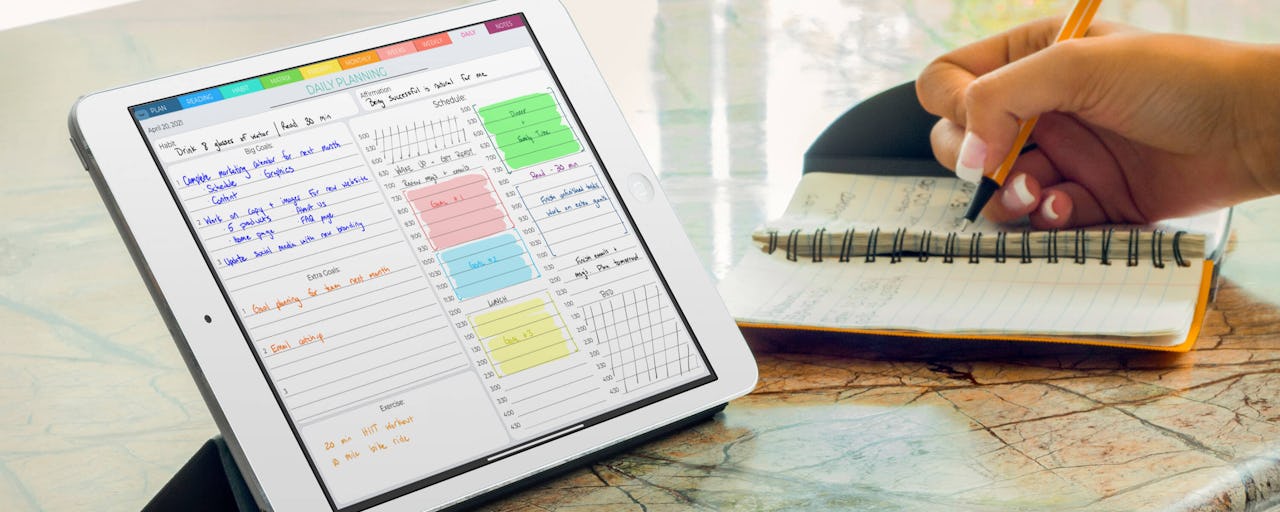
Budget Planner - The Benefits of Keeping a Money Diary
July 05, 2021 • 5 min read
Ah, money. We all like having it, whether we care to admit it or not. Some of us are penny-pinchers, some of us like to spend hard and fast. But no matter what your income or how big your savings account is, it's always nice to have more money in your account and keeping track of your dollars is one of the most important life lessons you will ever learn.
In this post, we take a look at the benefits of keeping a money diary and the top 8 ways a budget planner can help you to take control of your finances. Let’s get into it!
1. Track Your Spending with a Money Diary
First things first: where on EARTH is your money going each month? Dollars are slippery things and can disappear without a trace. This is where your money diary comes in. It’s a bit of effort, granted, but keeping note of everything you earn and everything you spend is the best possible way to get a handle on your finances.
Money diaries are so popular these days that people are sharing theirs online in a bid to bring some transparency to a long hush-hushed subject. While you certainly don’t have to share the details of your own money diary, checking out other people’s can be a great way to get some perspective about what’s going on in your own bank account!
2. Create a Budget Planner
We’re impulsive creatures, us human beings. Our best-laid plans are often dashed when our noses lead us into the nearest bakery or when we lose half our take-home pay to a magpie-ish love for shiny things.
One of the most powerful anti-spending tools at your disposal is a digital or physical budget planner. By writing down your weekly budget, you’re setting yourself up to seriously stick to it. No ifs, no buts, no maybes. Mental commitments are much easier to break than goals and plans that are written down.
3. Plan Your Money Movements
Money comes, money goes - this is the circle of life. But how much money comes, and how much money goes? Well, that’s something we’d all do better to have a greater handle on. Planning your money movements is your next best step after deciding to create a budget planner. It essentially just means getting really pedantic about tracking what you are spending your dollars on and when setting aside money for each month’s outgoings and putting systems in place to stop you from spending more (such as automatic transfers to your savings accounts).
4. Manage Your Debts
Getting out of debt can feel really, really tough. But the fact is that well-planned, regular payments WILL see you through it eventually. Every step you take up that mountain, no matter how small, will see you closer to the top.
Keeping a money diary and creating a budget planner is an excellent way of managing your debts and loans so you have a clear path to financial freedom. Fill out your planner with payment dates, interest rates, and loan terms, and once it’s all down on paper, see if you can stretch to slightly bigger repayments each month. The sooner it’s paid off, the better!
5. Set Yourself Up for Savings Success
Are you putting a little aside each month and feeling happy about ‘saving’ some money? Having any savings at all is commendable, but ask yourself this: Am I really saving enough? If you wind up cleaning out your savings account in half a year’s time to go on holiday, then what will you do about that next big medical bill? Or further ahead - how will you pay your bills in retirement?
A fun and easy way to save more money is by doing a "Money Saving Challenge". There are all different kinds of challenges with different difficulties but the goal is the same, help you save more money. You can start with a small one and work your way up and watch your savings account grow, it's a lot more fun this way!
Your budget planner is the best place to set up some serious savings objectives and to plan out how you’re going to reach them.
6. Create Better Financial Habits
A better relationship with your money starts in the pages of your money diary or budget planner. Setting aside a dedicated space to monitor and plan your financial situation is an excellent first step towards a comfortable life and retirement. One of the most common financial bad habits people have is a tendency to ignore their finances or let their situation coast along. Get a planner, get planning, and regain some control over one of the most important aspects of your life.
7. Set Aside Your ‘Nice-to-Haves’
This month I want a new car, a pony, and to eat out for dinner every single night. But just because I want all those things, doesn’t mean I should go out and get them. Keeping a dedicated page or two in your planner for the big-ticket items you’d love to buy is a great way of putting them on ice for now. By writing them down you’re acknowledging that they’re important to you, but also that they’re something to plan for, not simply to impulse buy. And if you’re lucky, you’ll check back on that page in a few week's time and realize that you don’t want one or some of those things anymore after all!
8. Use Your Budget Planner to set Goals
You’ve got to dream big in life, especially when it comes to money, cos you’re gonna need a lot of that stuff! Use a page in your budget planner or money diary to layout your broad financial goals. Writing them down will help you keep your eye on the prize and to weave your financial goals in with your broader professional and personal plans too.
Create a Budget Planner or Money Diary Today!
There should be nothing stopping you from starting your very own money diary today - it really is the easiest life change you can make. All you need is a good dose of self-motivation to start tracking everything you bring in each day, week, and month, and everything that goes out. By keeping a money diary you’ll quickly start to see where you’re bleeding cash - whether it be the cost of your daily cup of coffee or expensive trips to the hair salon.
You might be saying, "Well that is all good on paper, but I'm on a tight budget so doing that is difficult." You're right, it can be difficult to save money on a tight budget, but we have you covered, we have an entire article on the subject. Just remember, baby steps lead to bigger things.
Once you’ve got a good idea of your current spending habits, you can create a budget planner to set yourself up with some better financial habits! Our digital budget planner is an amazing tool for doing just that - make sure you check out our easy-to-use budget planner.
How Boss Personal Planner can help you
- Interested in a budget planner, we offer digital and printable options
- Our digital planners give you that pen and paper writing ability with the benefits of being digital. You can shop digital planners here.
- If you're new to digital planning, we have a nice article giving you everything you need to know.
- If you're a fan of more traditional paper planners, we offer 2 different styles of paper planner notebooks. *Currently liquidating our paper planners. While supplies last.*
- Interested in more articles on how you can increase productivity or self-improvement.
- 1% of every order is donated to charity.
Also in articles

Join our VIP club
Subscribe to our monthly newsletter for sneak peeks at new collections and early access to promos and flash sales!


